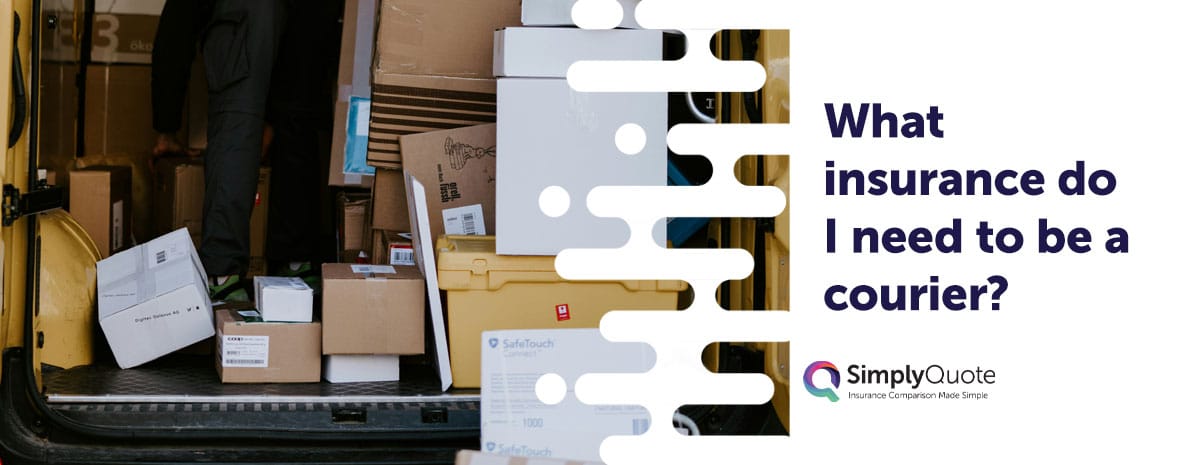What insurance do I need to be a courier?
To be a courier in the UK, you legally need hire and reward vehicle insurance—but for full protection, most drivers also carry goods in transit and public liability cover.
If you’re self-employed, working for delivery platforms, or running a small fleet, it pays to understand the difference.
Hire and reward is the absolute minimum. Without it, you’re not legally covered to carry goods for payment—even if you already have standard van or car insurance. But that only protects the vehicle, not the parcels inside or your liability if something goes wrong at a delivery address.
That’s where additional cover comes in. Goods in transit insurance protects the items you’re delivering from loss, damage, or theft. Public liability insurance covers you if you injure someone or damage property while on the job. And if you employ others, you’re legally required to have employers’ liability insurance too.
Some couriers also add legal expenses, breakdown cover, or excess protection to round out their policy—especially those working full time or handling high-value goods.
This guide breaks it all down. Whether you’re delivering with Amazon Flex, working freelance for a logistics firm, or launching your own courier service, you’ll find everything you need to choose the right cover and stay compliant.

What is the legally required insurance for couriers?
All couriers in the UK are legally required to have hire and reward vehicle insurance.
This specific type of cover allows you to carry goods in exchange for payment. Without it, your standard vehicle policy becomes invalid the moment you start delivering commercially.
This requirement is set out in the Road Traffic Act 1988 and enforced through penalties like:
- A £300 fixed fine
- Six points on your licence
- An IN10 conviction (driving without valid insurance), which stays on your record for five years
- Possible vehicle seizure and even disqualification from driving
It doesn’t matter if you’re delivering parcels once a week or full time. If you’re being paid, or the delivery is part of your business activities, hire and reward is mandatory.
Some drivers try to use social, domestic, and pleasure (SD&P) or standard commercial cover instead—but these don’t extend to delivery work. And while some platforms offer short-term hire and reward options (like pay-as-you-go insurance), you’re still responsible for making sure it’s active every time you drive.
Bottom line: no hire and reward, no legal cover. And if you’re caught working without it—even between shifts or with no parcels onboard—you’re not just uninsured… you’re in breach of the law.
Looking to compare courier insurance? Get your quote today!
Get QuotesWhat does goods in transit insurance cover?
Goods in transit insurance protects the items you’re delivering against loss, damage, or theft while they’re in your care.
It doesn’t cover your van or your liability—it strictly protects the value of the cargo you’re paid to transport.
If a parcel gets stolen from your van, damaged during unloading, or lost between depot and destination, you’re liable—unless you’ve got goods in transit cover in place.
Here’s what’s typically covered:
- Theft – As long as your van is locked and forced entry can be proven.
- Damage – Dropped parcels, crushed boxes, rain-soaked goods—it all adds up.
- Loss in transit – If the item disappears en route or ends up with the wrong recipient.
- Loading/unloading incidents – Many policies include cover from the moment the item leaves the sender’s hands to the time it’s delivered.
Some platforms (like Amazon Flex, Yodel, or independent logistics firms) may require this insurance before you can work with them—especially if you’re delivering high-value items. Others don’t check, but you’ll regret skipping it the first time something goes wrong.
It’s not legally mandatory, but it’s standard for professionals—and in many cases, skipping it is a false economy. After all, if you’re carrying thousands of pounds worth of someone else’s goods, it’s smart to avoid being the one who pays if it goes missing.
Related Read: What’s The Difference Between Courier Insurance & Goods in Transit?
Why should couriers consider public liability insurance?
Public liability insurance covers you if you injure someone or damage their property while making a delivery.
It’s not a legal requirement, but for many couriers, it’s essential protection—especially if you deliver to homes, offices, or public buildings.
Imagine these scenarios:
- You scratch someone’s car while carrying a box past their driveway
- A customer trips over a package you left outside their door
- You accidentally knock over a valuable item when stepping into a client’s premises
Without public liability cover, you’re personally liable for the cost of damages, medical bills, and legal fees. That’s a serious risk—particularly for sole traders who don’t have a company structure to shield them.
Most courier policies allow you to add public liability for just a few pounds a month. Cover limits usually start at £1 million, with higher limits of £2 million or £5 million common for couriers working in commercial settings or under contract with larger organisations.
Many public-sector contracts (e.g. council, NHS, or school deliveries) require you to show proof of public liability cover before work begins. Even some residential customers and online platforms now ask for it as part of onboarding.
In short: if you interact with the public while delivering—whether full-time or occasionally—this isn’t a “nice to have.” It’s a smart, affordable layer of legal and financial defence.
Related Read: What Is Public Liability Insurance?
When do you need employers’ liability insurance?
You legally need employers’ liability insurance if you hire anyone to help with your courier business—even on a casual, part-time, or subcontracted basis.
The law applies from the moment someone works under your direction, not just when they’re on your payroll.
This requirement is enforced under the Employers’ Liability (Compulsory Insurance) Act 1969. The fine for not having it? Up to £2,500 per day that you’re uninsured.
Here’s who it covers:
- Full-time and part-time employees
- Temporary drivers or assistants
- Apprentices or work-experience placements
- Even subcontractors if they don’t have their own cover and are working under your control
Employers’ liability insurance covers you if an employee becomes ill or is injured while working for you. That could mean anything from lifting-related injuries to accidents during loading, or even stress-related claims if the working environment is poor.
It’s not the same as public liability, which protects against third-party claims. This specifically protects you against claims made by your staff—and in many industries, it’s a legal must-have the moment your business grows beyond just you.
If you’re a sole trader with no staff, you don’t need it. But if you’re scaling, partnering, or taking on help—even informally—don’t skip this.
Are there other optional courier insurance add-ons?
Yes—courier insurance can be expanded with optional extras that protect your income, reduce your risk, and keep you moving if things go wrong.
While not mandatory, these add-ons are especially valuable for full-time drivers or anyone relying on delivery income to pay the bills.
Here are the most common additions:
- Legal Expenses Insurance – Covers solicitor fees and court costs if you need to defend a claim, pursue unpaid invoices, or deal with contract disputes.
- Breakdown Cover (Courier-specific) – Standard breakdown policies don’t always cover working vehicles with onboard goods. Courier-specific recovery often includes onward delivery support or temporary van hire.
- Replacement Vehicle Cover – Ensures you get a like-for-like van if yours is off the road—crucial if you can’t afford downtime.
- Excess Protection – Covers the cost of your excess if you have to make a claim, softening the financial blow.
- Windscreen and Window Cover – Particularly useful for courier vans that spend a lot of time on the motorway—stone chips happen.
Some insurers also offer tool cover, personal accident insurance, or income protection if you’re running your courier business as a sole trader.
Are these essential? Not for everyone. But if a breakdown would cost you a week’s income—or a small claim would wipe out your margin—these extras start looking less like luxuries and more like smart business decisions.
How much does courier insurance cost?
Courier insurance typically costs between £1,000 and £2,000 per year for a comprehensive policy, with goods in transit and public liability added.
Prices vary based on your vehicle, experience, location, and the type of deliveries you make.
Here’s a general breakdown:
| Cover Type | Typical Annual Cost |
|---|---|
| Hire & Reward (vehicle cover) | £900 – £1,600 |
| Goods in Transit | £100 – £250 |
| Public Liability | £60 – £150 |
| Combined Courier Policy | £1,100 – £2,200+ |
Related Read: How Much Does Courier Insurance Cost In The UK?
Other factors that influence price include:
- Vehicle type and age – Larger vans or newer vehicles tend to cost more.
- Delivery area – Urban couriers may face higher premiums due to increased risk of theft, congestion, or claims.
- Driver experience – Couriers with clean records and several years of experience often pay less.
- Type of goods delivered – Transporting high-value, fragile, or hazardous items usually raises the premium.
- Platform or contract requirements – Some employers or delivery networks require specific cover limits or policy types.
Many insurers offer monthly payment plans, and bundling cover into one courier-specific policy can lead to savings compared to buying each element separately.
Final thoughts
Getting started as a courier isn’t just about having a vehicle and a delivery app—it’s about being properly protected from day one. Hire and reward insurance might make you legal, but it won’t cover the real-world risks that come with the job.
Every delivery involves responsibility. What if the parcel goes missing? What if you damage someone’s property during a drop-off? What if your van breaks down in the middle of a shift?
That’s why smart couriers look beyond the legal minimum. Goods in transit protects the cargo. Public liability protects you from third-party claims. Employers’ liability becomes essential the moment someone else is involved. And extras like breakdown cover or legal expenses keep you on the road—and in business—when things don’t go to plan
So don’t think in terms of “What’s the cheapest insurance I can get?”
Ask instead: “What would it cost me if I didn’t have the right cover?”
Because in this business, protection isn’t a luxury—it’s part of being professional.
Frequently Asked Questions (FAQs)
Yes. You need hire and reward cover at a minimum. Many platforms also expect goods in transit and public liability insurance—especially for self-employed drivers.
No. Standard vehicle insurance doesn’t cover commercial delivery work. You’ll need hire and reward insurance to be legally protected.
Not by law, but it’s essential if you’re carrying valuable items. Many platforms and clients expect you to have it—and you’re liable if things go wrong.
It’s not mandatory, but strongly recommended. It covers you if someone is injured or their property is damaged while you’re making a delivery.
Hire and reward is a usage type; courier insurance is a full policy that includes hire and reward plus extras like goods in transit or liability cover.
Only if you hire others. The law requires employers’ liability cover for any staff—even part-time or subcontracted workers under your control.
Yes. Most insurers offer monthly plans, especially for self-employed drivers. Just check whether interest is added to monthly instalments.
Yes. Some insurers offer flexible or pay-as-you-go policies for part-time or occasional drivers. Be sure they include hire and reward cover.
